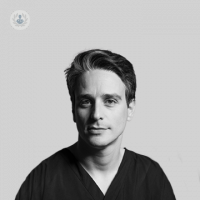Endonasal DRC surgery: an expert's guide
Written by:Dr Nick Koutroumanos is a London-based oculoplastic surgeon specializing in conditions causing a watery eye, and offers exceptional care and expertise to patients seeking relief through endonasal Dacryocystorhinostomy (DCR) surgery. In his latest online article, Dr Koutromanos outlines the benefits of endonasal DCR over external DCR, describes the consultation process, explains what patients can expect before, during, and after surgery, and provides guidance on how to prepare for the procedure. Furthermore, he addresses the potential complications of endonasal DCR while highlighting his commitment to assessing candidacy for the surgery and ensuring excellent outcomes based on an annual audit.

What is Endonasal DCR Surgery?
Endonasal DCR surgery is a minimally invasive procedure designed to restore normal tear drainage in patients suffering from a watery eye caused by nasolacrimal duct obstruction (blocked tear duct). This surgical approach offers significant advantages over traditional external DCR, including a shorter recovery period, improved cosmetic outcome, and reduced risk of complications.
Who is an ideal candidate for Endonasal DCR Surgery?
First and foremost, it is imperative that a diagnosis of nasolacrimal system stenosis or obstruction (a blocked tear duct) is established. Only a relatively small proportion of watery eyes is attributable to a ‘blocked tear duct’.
During the comprehensive assessment, patients seeking relief from a watery eye due to nasolacrimal duct obstruction (blocked tear duct) will be evaluated to determine if they are suitable candidates for endonasal DCR surgery.
Dr Koutroumanos carefully reviews the patient's medical history, conducts a thorough examination, and may perform diagnostic tests, such as lacrimal sac syringing and imaging studies, to confirm the diagnosis and assess candidacy for the procedure.
This thorough assessment ensures that the treatment plan is tailored to the specific needs of each patient.
How can patients prepare for the surgery?
To prepare for endonasal DCR surgery patients are encouraged to provide complete information regarding medications, allergies, and any relevant medical conditions. Dr Koutroumanos provides detailed pre-operative instructions, including fasting requirements and medication management guidelines.

By following these instructions, patients can optimize their readiness for surgery. Specifically, any medication used to thin one’s blood (anticoagulants, antiplatelets) will have to be paused. Our team will provide you with clear directions.
What does the surgery entail?
Before Surgery
On the day of the procedure, patients are prepared for surgery, including the administration of any necessary anaesthesia. Dr Koutroumanos addresses any final concerns and ensures patient comfort and well-being throughout the process. You will be admitted into a day surgery ward, be allocated a comfortable and private room and prepare for surgery while being looked after by our nursing staff.
During Surgery
Dr Koutroumanos performs endonasal DCR surgery using minimally invasive techniques, accessing the blocked tear drainage pathway through the nasal cavity. With the aid of specialized instruments and endoscopic visualization, Dr Koutroumanos achieves precise and controlled manipulation. The duration of the surgery typically ranges from 45 minutes to 90 minutes.
After Surgery
Following the procedure, patients are closely monitored in a recovery area until they are alert and stable. Temporary discomfort, swelling, or nasal congestion may occur but will subside over time. Our patients rarely report pain. We will however provide pain medication, nasal irrigation instructions, and comprehensive post-operative care guidelines to ensure a smooth recovery process.
What are the benefits of Endonasal DCR surgery?
Endonasal DCR surgery offers numerous benefits, including a shorter recovery period, improved cosmetic outcome (as there are no external incisions), and reduced risk of complications such as infection or scarring. The procedure effectively addresses tear drainage obstruction, providing long-term relief from watery eyes and improving overall quality of life.
Does Endonasal DCR surgery come with any risks?
While Endonasal DCR is generally a safe and successful procedure, like any surgery, it carries potential risks. These may include but are not limited to:
- Bleeding
- Infection
- Scar tissue formation
- Nasal adhesions or synechiae
- Persistent tearing
- Nasal crusting
- Nasal septum perforation (rare)
- Damage to surrounding structures (rare)
Dr Nick Koutroumanos is a highly skilled oculoplastic surgeon based in London and specializing in endonasal DCR surgery, provides patients with exceptional care, expertise, and a commitment to achieving excellent outcomes. By assessing candidacy for surgery during a personalized consultation, informing patients about the procedure, and guiding them through the preparation and recovery process, our team ensures that patients receive the highest level of care for their watery eye condition. If you would like to book a consultation with Dr Koutroumanos, you can do so today via his Top Doctors profile.


